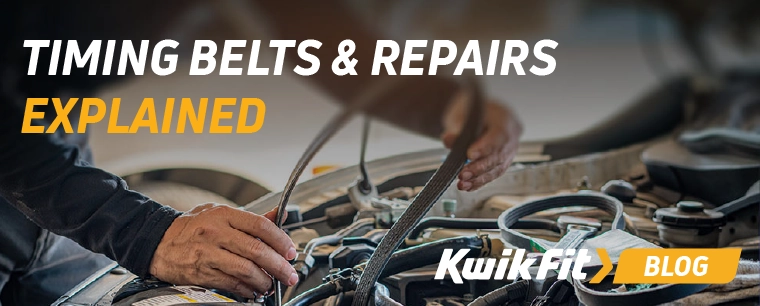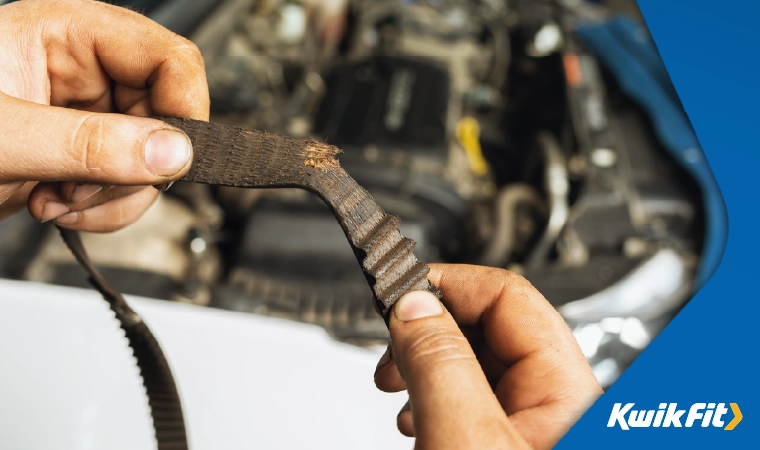Timing Belts & Repairs Explained
Jessica Bird | Thursday 4th December 2025 4:00pm

Your carís engine is a finely-tuned machine, and at the heart of it all is one small but vital component: the timing belt. Without it, the synchronised movement of pistons and valves falls apart, and the entire engine can come to a grinding halt.
But what does a timing belt actually do? When should it be replaced? And what happens if it fails?
Hereís everything you need to know about keeping your timing belt in top condition.
What is a timing belt?
The timing belt (sometimes also known as a cam belt) is a reinforced rubber belt with teeth that keeps your engineís internal parts working in perfect harmony.
It connects the crankshaft, which moves the pistons, with the camshaft, which opens and closes the valves at precise intervals. When these two components stay in sync, the engine runs smoothly and efficiently.
Think of it like a conductor in an orchestra: every musician (or engine part) plays their role, but the timing belt keeps everyone on beat.
Is a cambelt the same as a timing belt?
Yes, ďcambeltĒ is simply another term for a timing belt, especially used in the UK. Both refer to the same crucial component. For a deeper look at cambelt maintenance, you can read our article When Do I Need to Change My Cambelt?
How does a timing belt work?
Your carís engine relies on precise timing to control combustion. The timing belt ensures the valves open and close in sync with the pistonsí movement, allowing fuel and air in, and exhaust gases out, at exactly the right moments.
The beltís toothed design prevents slippage and maintains the engine's correct rhythm. Itís usually made from durable rubber compounds reinforced with materials like fibreglass or Kevlar for strength and longevity.
Some vehicles use a timing chain instead, a metal alternative designed to last longer, but one that can still require maintenance over time.
When should I replace my timing belt?
A timing belt wonít last forever. Over time, heat, friction, and age cause it to wear down, crack, or stretch, and if it fails while the engine is running, it can cause serious damage.
Most vehicle manufacturers recommend replacing the timing belt every 60,000 to 100,000 miles, or roughly every five to seven years, whichever comes first.
However, these are only general guidelines. Your carís make, model, and engine design all play a part, so itís always best to check your vehicle handbook or ask a qualified technician for advice, which you can do at your local Kwik Fit centre.
If youíve recently bought a used vehicle, itís worth confirming when the timing belt was last changed, especially if thereís no record in the service history.

Timing belt warning signs
While itís not always easy to spot problems with a timing belt, there are a few tell-tale signs that could indicate wear or impending failure:
Ticking or rattling noises coming from the engine Engine misfires or running roughly Oil leaks from the front of the engine Difficulty starting or sudden stalling Visible wear, cracking, or fraying on the belt
Because the timing belt is hidden deep within the engine, these symptoms can be subtle, and by the time a clear fault appears, it may already be too late. Regular servicing is the safest way to catch any issues early.
What happens if a timing belt breaks?
If your timing belt breaks while the engine is running, the results can be catastrophic.
When the belt fails, the camshaft and crankshaft fall out of sync. The pistons and valves then collide at high speed, causing extensive internal engine damage. In many cases, this means a full engine rebuild or replacement.
Thatís why preventative maintenance is key. Replacing your timing belt on schedule costs far less than repairing the damage caused by a snapped one, and helps protect your vehicleís long-term performance.
What affects timing belt replacement cost?
Timing belt replacement cost can vary depending on several factors:
- Your vehicleís make and model
- Engine size and configuration
- Labour time and parts required
- Whether other components, such as tensioners or pulleys, need to be changed at the same time.
While it can seem like a significant expense, itís far more affordable than the repairs required after a belt failure. A professional replacement ensures your engine stays protected and performing at its best.
Can you replace a timing belt yourself?
No, not easily. Replacing a timing belt isnít a quick DIY job; itís a precise task that demands specialist tools, manufacturer data, and experience.
At Kwik Fit, our technicians follow manufacturer-approved methods and use quality components designed specifically for your vehicle.
During a replacement, experts will typically:
- Inspect the entire belt system, including pulleys and tensioners
- Fit new parts to the correct torque and alignment
- Check for related wear that could affect engine performance
This level of precision ensures your engine timing remains perfectly calibrated and helps you enjoy reliable performance between services.
Keeping your engine in perfect timing
Your timing belt might be hidden from sight, but itís one of the most important parts of your carís engine. By replacing it at the right time and trusting trained professionals to do the work, youíll keep your car running smoothly and avoid costly damage later on.
To stay ahead of wear and tear, our Kwik Fit technicians can inspect your timing belt as part of a comprehensive vehicle service or a free safety check. Book one in at your local Kwik Fit centre today and keep your car running in perfect rhythm.
Any facts, figures and prices shown in our blog articles are correct at time of publication.
Featured Articles
Is it Illegal to Drive With One Headlight?
Saturday 19th July 2025
Wondering if itís illegal to drive with one headlight? Learn about the safety risks and penalties of illegal blown bulbs and why you should fix them promptly.
Air Con in EVs & Hybrids: Experts Answer Your Questions
Monday 30th June 2025
Does air con drain EV batteries? Can you use the air con while charging an electric car? Find out the answers to these questions & more from Kwik Fitís experts.
Why Is Your Car Making a Noise? Fixes & Tips
Friday 13th June 2025
When your car starts making unexpected noises, it can certainly be quite disconcerting; it may be nothing to worry about, but hereís what you need to know.









